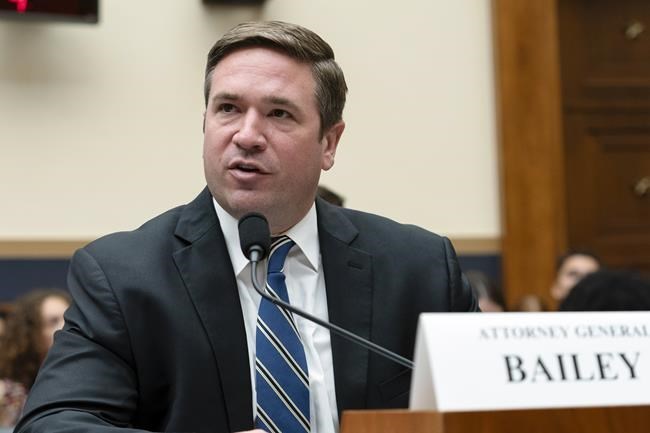
FILE - Missouri Attorney General Andrew Bailey testifies before the House Judiciary Committee hearing on the Manhattan District Attorney's Office, June 13, 2024, on Capitol Hill in Washington. A Missouri judge on Tuesday, July 2, set an Aug. 21 date for a hearing to determine if Marcellus Williams is innocent of the murder that landed him on death row — a hearing that comes just a little over a month before Williams is scheduled to die. Bailey is opposing the effort to vacate Williams' conviction. (AP Photo/Jose Luis Magana, File)
July 02, 2024 - 12:14 PM
ST. LOUIS (AP) — A Missouri judge on Tuesday set an Aug. 21 date for a hearing to determine if Marcellus Williams is innocent of the murder that landed him on death row — a hearing that comes just a little over a month before Williams is scheduled to die.
Williams, 55, was convicted of first-degree murder in the 1998 stabbing death of Lisha Gayle during a robbery of her suburban St. Louis home. He was hours away from execution in August 2017 when he was given a reprieve after testing unavailable at the time of the killing showed that DNA on the knife matched someone else, not Williams.
Questions about DNA evidence prompted St. Louis County Prosecuting Attorney Wesley Bell to file a motion in January to vacate the murder conviction. The new hearing date is in response to Bell's motion. Meanwhile, Williams is scheduled to be executed Sept. 24 at the state prison in Bonne Terre, Missouri.
A 2021 Missouri law allows prosecuting attorneys to file a motion to vacate a conviction if they believe an inmate could be innocent or was otherwise erroneously convicted.
Typically, the judge takes several weeks to weigh the evidence after the hearing ends. In this instance, it isn't certain St. Louis County Circuit Judge Bruce Hilton will rule on the innocence claim before the execution date — creating the possibility that Missouri could execute a man later deemed innocent by a judge.
Missouri Attorney General Andrew Bailey's office opposes the effort to vacate the murder conviction. Bailey's office didn't immediately respond to an email asking if Bailey would seek to postpone the execution until a ruling is reached on the innocence claim.
Tricia Rojo Bushnell, an attorney for the Midwest Innocence Project, urged the state to put the execution on hold.
“The Attorney General should not be trying to block the court’s review and the Missouri Supreme Court should stay Mr. Williams’s execution,” Bushnell said in an email.
The Missouri Supreme Court set the execution date on June 4, hours after it ruled that Republican Gov. Mike Parson was within his rights when he dissolved a board of inquiry convened six years earlier by Parson’s predecessor.
Gov. Eric Greitens, also a Republican, halted the execution with just hours to spare in 2017, citing the DNA evidence. The inquiry board he appointed was made up of five retired judges.
The board never issued a ruling or reached a conclusion, nor did it issue a report. Parson dissolved the board in June 2023, saying it was time to “move forward."
Since adoption of the 2021 law, two men who each spent decades in prison have had murder convictions vacated, and a third case is pending several weeks after a hearing.
In 2021, Kevin Strickland was freed after more than 40 years for three killings in Kansas City after a judge ruled he had been wrongfully convicted in 1979. In 2023, a St. Louis judge overturned the conviction of Lamar Johnson, who served nearly 28 years for a killing he always said he didn’t commit.
A St. Louis judge is still weighing the fate of Christopher Dunn after a hearing in May. Dunn has spent 33 years in prison for the shooting death of a 15-year-old boy in 1990.
Williams is the first death row inmate whose innocence claim will go before a Missouri judge — an “unprecedented situation,” Bell said in a statement. But another death row inmate was freed two decades ago.
Joseph Amrine spent 17 years on death row before he was freed in 2003 after the Missouri Supreme Court ruled that no credible evidence linked him to the killing of another inmate. Key testimony against Amrine came from three former inmates, all of whom later recanted. Prosecutors then decided not to retry him.
Prosecutors at the time of the crime said Williams broke a windowpane to get inside Gayle’s home on Aug. 11, 1998, heard water running in the shower, and found a large butcher knife. When Gayle came downstairs, she was stabbed 43 times. Her purse and her husband’s laptop were stolen. Gayle was a social worker who previously worked as a reporter for the St. Louis Post-Dispatch.
Authorities said Williams stole a jacket to conceal blood on his shirt. Williams’ girlfriend asked him why he would wear a jacket on a hot day. The girlfriend said she later saw the laptop in the car and that Williams sold it a day or two later.
Prosecutors also cited testimony from Henry Cole, who shared a St. Louis cell with Williams in 1999 while Williams was jailed on unrelated charges. Cole told prosecutors Williams confessed to the killing and offered details about it.
Williams’ attorneys responded that the girlfriend and Cole were both convicted felons out for a $10,000 reward.
——
Heather Hollingsworth in Mission, Kansas, contributed to this report.
News from © The Associated Press, 2024